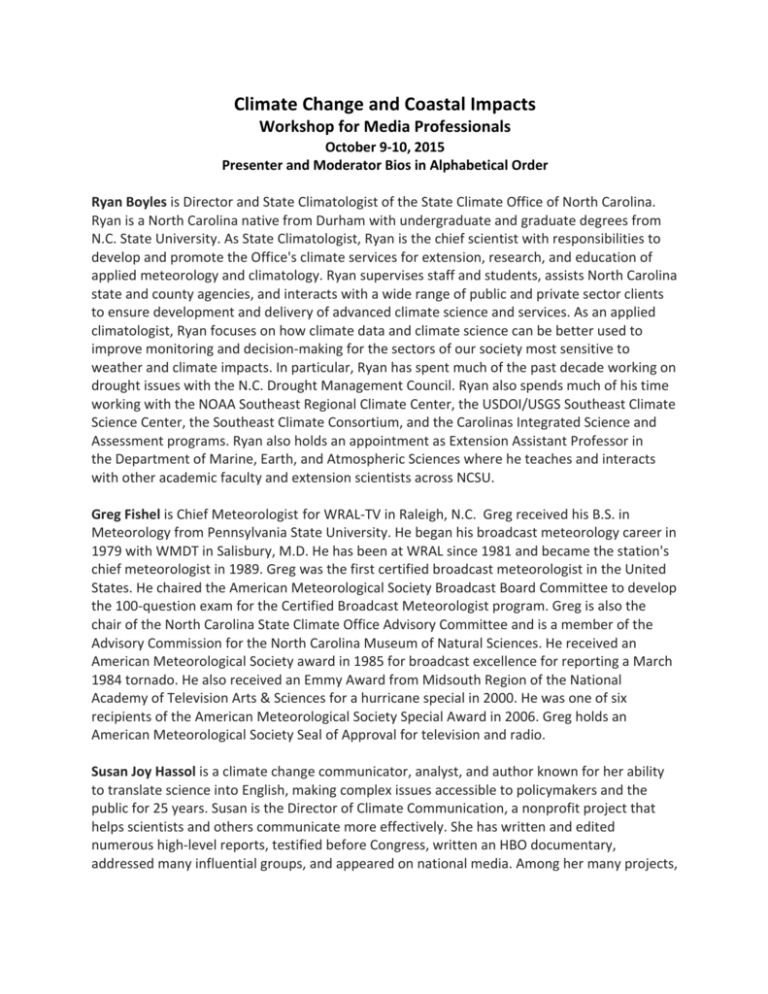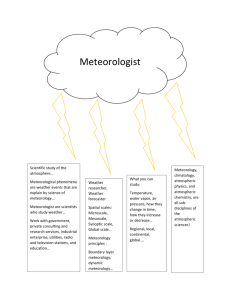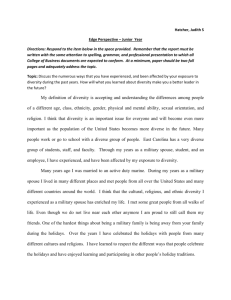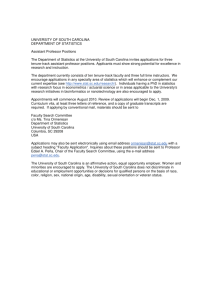Climate Change and Coastal Impacts
advertisement

Climate Change and Coastal Impacts Workshop for Media Professionals October 9-­‐10, 2015 Presenter and Moderator Bios in Alphabetical Order Ryan Boyles is Director and State Climatologist of the State Climate Office of North Carolina. Ryan is a North Carolina native from Durham with undergraduate and graduate degrees from N.C. State University. As State Climatologist, Ryan is the chief scientist with responsibilities to develop and promote the Office's climate services for extension, research, and education of applied meteorology and climatology. Ryan supervises staff and students, assists North Carolina state and county agencies, and interacts with a wide range of public and private sector clients to ensure development and delivery of advanced climate science and services. As an applied climatologist, Ryan focuses on how climate data and climate science can be better used to improve monitoring and decision-­‐making for the sectors of our society most sensitive to weather and climate impacts. In particular, Ryan has spent much of the past decade working on drought issues with the N.C. Drought Management Council. Ryan also spends much of his time working with the NOAA Southeast Regional Climate Center, the USDOI/USGS Southeast Climate Science Center, the Southeast Climate Consortium, and the Carolinas Integrated Science and Assessment programs. Ryan also holds an appointment as Extension Assistant Professor in the Department of Marine, Earth, and Atmospheric Sciences where he teaches and interacts with other academic faculty and extension scientists across NCSU. Greg Fishel is Chief Meteorologist for WRAL-­‐TV in Raleigh, N.C. Greg received his B.S. in Meteorology from Pennsylvania State University. He began his broadcast meteorology career in 1979 with WMDT in Salisbury, M.D. He has been at WRAL since 1981 and became the station's chief meteorologist in 1989. Greg was the first certified broadcast meteorologist in the United States. He chaired the American Meteorological Society Broadcast Board Committee to develop the 100-­‐question exam for the Certified Broadcast Meteorologist program. Greg is also the chair of the North Carolina State Climate Office Advisory Committee and is a member of the Advisory Commission for the North Carolina Museum of Natural Sciences. He received an American Meteorological Society award in 1985 for broadcast excellence for reporting a March 1984 tornado. He also received an Emmy Award from Midsouth Region of the National Academy of Television Arts & Sciences for a hurricane special in 2000. He was one of six recipients of the American Meteorological Society Special Award in 2006. Greg holds an American Meteorological Society Seal of Approval for television and radio. Susan Joy Hassol is a climate change communicator, analyst, and author known for her ability to translate science into English, making complex issues accessible to policymakers and the public for 25 years. Susan is the Director of Climate Communication, a nonprofit project that helps scientists and others communicate more effectively. She has written and edited numerous high-­‐level reports, testified before Congress, written an HBO documentary, addressed many influential groups, and appeared on national media. Among her many projects, Susan was the Senior Science Writer and communication strategist on all three U.S. National Climate Assessments. For more information, see climatecommunication.org Aranzazu Lascurain is Program Coordinator with the Southeast Climate Science Center. She has a broad background in environmental conservation and resource planning. She has worked for city, county and state agencies in the west on water quality management and endangered species protection. She has worked in environmental education in the South Pacific Islands and international climate change policy while at Stanford University. Most recently she was an extension agent at the N.C. Solar Center where she worked under the Dept. of Energy’s Clean Cities mandate to displace petroleum use with alternative fuels. Mike Mann is Director of the Penn State Earth System Science Center and a member of the Penn State University faculty, holding joint positions in the Departments of Meteorology and Geosciences, and the Earth and Environmental Systems Institute. His current research includes model/data comparisons aimed at understanding the long-­‐term behavior of the climate. He has received the outstanding publication award from NOAA, and in 2002 was selected as one of the 50 leading visionaries in science and technology by Scientific American. Mike is author of more than 130 peer-­‐reviewed and edited publications. He received his undergraduate degrees in Physics and Applied Math from the University of California at Berkeley, an M.S. degree in Physics from Yale University, and a Ph.D. in Geology & Geophysics from Yale University. See more at: https://www.climatecommunication.org/who-­‐we-­‐are/advisors/michael-­‐ mann/#sthash.F8QPXygc.dpuf Todd Miller is Executive Director of the North Carolina Coastal Federation, a nonprofit environmental organization that works for a healthy coast. Todd is a native of coastal North Carolina and founded the Federation in 1982. He is a founding board member of Restore America’s Estuaries and has served on its board with other national leaders in coastal habitat restoration since 1995. Todd currently serves on the Board of Visitors for the UNC Institute for the Environment, as well as the chair of the Policy Committee for the Albemarle-­‐Pamlico Estuary Partnership. As executive director, Todd formulates the Federation’s goals and policy positions, serves as the organization’s spokesperson and provides staff and operations oversight. Todd holds an undergraduate and master’s degree from the University of North Carolina at Chapel Hill. He was selected as a distinguished alumnus from the university in 2013. Todd was awarded the Peter Benchley Ocean Awards “Hero of the Seas” award in 2015. Dr. Charles “Pete” Peterson is an Alumni Distinguished Professor with the University of North Carolina at Chapel Hill. His research is in the field of marine conservation ecology. He has served on the N.C. Marine Fisheries Commission, N.C. Environmental Management Commission, N.C. Sediment Control Commission, and is former chair of the Steering Committee for the N.C. Coastal Habitat Protection Plan. Pete has also served on several study panels of the U.S. National Academy of Sciences and was awarded a Pew Fellowship in Ecology and Environment in 1994. He holds a B.A. in biology from Princeton and an M.S. in zoology and Ph.D. in biology from the University of California at Santa Barbara. His research interests can perhaps be best described as interdisciplinary marine conservation ecology. Thomas Peterson is the President of the World Meteorological Organization’s Commission for Climatology. In 2004, Essential Science Indicators ranked him as one of the top 1 percent of scientists in the field of Geosciences based on Journal Citation Reports. He was a lead author on the Nobel Peace Prize winning Intergovernmental Panel on Climate Change’s Fourth Assessment Report published in 2007. Foreign Policy Magazine named him one of the top 100 Leading Global Thinkers of 2013 for his work on Explaining Extreme Events from a Climate Perspective. In July Dr. Peterson retired from his position as Principal Scientist at NOAA’s National Centers for Environmental Information. Sean Sublette is an award-­‐winning meteorologist working on Climate Central’s Climate Matters program, bringing 19 years of experience as a broadcast meteorologist. Before joining Climate Central, Sean was Chief Meteorologist at WSET in Lynchburg, Virginia Previously, he was morning meteorologist at WSLS in nearby Roanoke. Sublette was also an Adjunct Professor at Lynchburg College. He has served on the American Meteorological Society's Distinguished Science Journalism Award Committee and has been a script reviewer for American Institute of Physics’ Discoveries and Breakthroughs in Science. He holds the AMS Certified Broadcast Meteorologist Seal and was a member of the AMS Board of Broadcast Meteorology from 2006-­‐ 09, serving as Board Chair in 2009. Sean earned his Master of Science and Bachelor of Science degrees in Meteorology from Penn State. Lexia Weaver is the North Carolina Coastal Federation’s Coastal Scientist and Central Regional Office Manager. Originally from Hialeah, Florida, Lexia joined the federation in April 2007 after moving to coastal North Carolina in 2002. Her background is in estuarine water quality and plant ecology and she has conducted over 12 years of research in estuarine environments in Florida, Delaware and North Carolina. Lexia holds a Master of Science and a Ph.D. in Marine Studies from the University of Delaware and a Bachelor of Science in Biology with a specialization in Marine Biology from Barry University in Miami Shores, Florida Lexia manages coastal restoration projects within the central region of North Carolina and supervises the central regional office.







